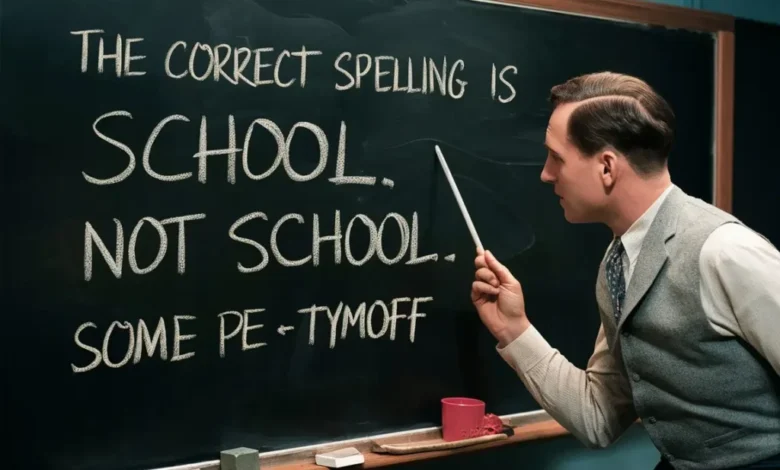the correct spelling is school not school. some pe – tymoff

Understanding the Spelling Debate
The spelling of the word “school” often the correct spelling is school not school. some pe – tymoff generates confusion, especially in a digital age marked by rapid communication and informal language usage. “School” originates from the Greek word “scholē,” which conveys the idea of leisure and education. This etymology reveals not only a rich history but also underscores the importance of the word in conveying structured learning environments. Misunderstandings surrounding its spelling frequently arise from the phonetic nature of English, where sounds can be represented in multiple forms, leading to incorrect variations such as “schoole” or even “shcool.”
In addition to phonetic issues, digital the correct spelling is school not school. some pe – tymoff communication has fostered a casual language culture that can blur the lines of formal spelling. Social media and instant messaging often prioritize speed over accuracy, which can contribute to the prevalence of misspellings. Such practices may seem harmless in the context of fun or informal discussions. However, they can propagate misunderstandings and hinder clarity in professional settings, where the correct spelling is vital. Texting shortcuts can lead to a lax approach to spelling, eroding the standards of language that were once more stringently adhered to.
Examples of common spelling errors include substituting “school” with variations like “skool” or using phonetic approximations. These alternatives can be particularly misleading, especially for learners who may be unsure of the correct form. Maintaining the correct spelling is important not only for clear communication but also for preserving the integrity of the language. A shared understanding, aided by correct spelling, contributes to effective dialogue and instruction, reinforcing the significance of the educational environments that the term “school” represents.
Common Misinterpretations and Mistakes
The word “school” is often misinterpreted and misspelled in various contexts, leading to frequent errors in both formal and informal communication. Common variations include “sckool,” “skool,” and “shool,” which, despite their phonetic semblance to the correct spelling, are incorrect. The visual and phonetic similarities between these alternatives the correct spelling is school not school. some pe – tymoff can easily result in confusion for writers. Additionally, some might mistakenly use “schoool” with an extra vowel, thinking it serves to emphasize the sound when, in fact, it is a spelling error.
Several factors contribute to these spelling mistakes. One prominent reason is the influence of slang and informal language prevalent on social media platforms. Users often prioritize brevity and creativity, which can lead to unorthodox spellings the correct spelling is school not school. some pe – tymoff intended for comedic or stylistic effect. For instance, a tweet may read, “I can’t wait to go to skool!” where the playful phonetic spelling reflects an informal tone but perpetuates misunderstanding of the correct spelling. Such casual language can infiltrate everyday writing, causing confusion, especially for younger audiences who may struggle with standard English conventions.
The rise of autocorrect features on smartphones may also mislead users. While these features aim to facilitate spelling accuracy, they the correct spelling is school not school. some pe – tymoff occasionally misinterpret intended words based on context or user input. For instance, a user might type “schoo,” and the software could suggest “scoo,” further muddling the understanding of the correct form. As a consequence, spelling inaccuracies persist even among those with a firm grasp of the English language. Highlighting these common errors can aid in promoting awareness and enhancing the proper use of the term “school” in various forms of communication.
The Importance of Correct Spelling in Education

Correct spelling is a fundamental the correct spelling is school not school. some pe – tymoff aspect of education that significantly influences communication skills and literacy development. In an academic environment, the ability to spell correctly allows students to convey their ideas clearly and effectively. When students struggle with spelling, their thoughts may become obscured, leading to potential misunderstandings during discussions or in written assignments. This becomes particularly critical in higher education, where precise communication is essential for successful collaboration and expression of complex ideas.
Research indicates that spelling proficiency is closely tied to overall literacy and educational outcomes. Students who demonstrate strong spelling abilities tend to perform better in reading and writing tasks. For example, a study might reveal that students with higher spelling accuracy achieve better grades in language arts, reflecting the interconnected nature of language skills. Furthermore, educators have a profound impact on cultivating a positive approach to spelling among students. Effective teaching strategies employed by teachers, such as integrating spelling activities into daily lesson plans or using technology-based tools, can foster an enjoyable learning atmosphere that encourages spelling mastery.
Various initiatives are underway to the correct spelling is school not school. some pe – tymoff improve spelling proficiency within schools. Programs designed to enhance literacy skills often include comprehensive spelling curricula that emphasize the importance of correct spelling from an early age. Additionally, educators and parents are encouraged to utilize resources such as spelling games and applications that engage students while encouraging progress. Collaborative efforts between teachers and parents can create a supportive environment that values the significance of spelling. By recognizing its the correct spelling is school not school. some pe – tymoff implications in educational contexts, schools can better equip students with crucial communication skills necessary for their academic and social success.
Tips and Strategies for Mastering Spelling
Mastering the correct spelling of words, particularly ‘school’, requires a combination of effective strategies and consistent practice. One useful approach is the use of mnemonic devices. For instance, associating the word ‘school’ with a familiar image, such as a classroom or a school bus, can create a mental link that aids recall. Additionally, breaking down the word into smaller segments, like ‘sch’ and ‘ool’, allows learners to focus on each component, making it easier to remember the overall spelling.

Engaging in spelling games can also make the learning process enjoyable and effective. Various games, such as word searches, crossword puzzles, and spelling bee competitions, encourage individuals to actively use their spelling skills in a fun environment. These interactive methods not only promote retention but also help to build the correct spelling is school not school. some pe – tymoff confidence in one’s spelling abilities. Furthermore, regular practice through writing exercises can reinforce the correct spelling of common words like ‘school’, ensuring they become second nature over time.
Technology plays a significant role in modern learning, offering numerous tools to combat spelling challenges. Numerous apps the correct spelling is school not school. some pe – tymoff and websites provide engaging quizzes, spelling tests, and interactive spelling lessons designed to improve one’s skills. These resources often include immediate feedback, which is essential for identifying mistakes and avoiding future errors. Additionally, word processors equipped with spell-check features can assist in catching typographical errors before sharing written communication.
In conclusion, mastering the correct spelling is an ongoing journey that involves persistent practice and the implementation of effective strategies. Incorporating mnemonic devices, spelling games, and leveraging technological tools are practical methods to improve spelling proficiency. It is essential for individuals to remain conscious of their spelling habits to enhance their communication skills continually.the correct spelling is school not school. some pe – tymoffIn conclusion, mastering the correct spelling is an ongoing journey that involves persistent practice and the implementation of effective strategies. Incorporating mnemonic devices, spelling games, and leveraging technological tools are practical methods to improve spelling proficiency. It is essential for individuals to remain conscious of their spelling habits to enhance their communication skills continually.


